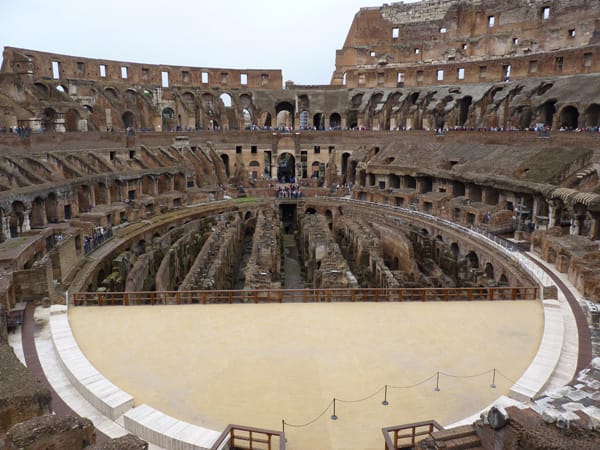Bread and circuses
With Super Bowl XLVI upon us, I summoned the ghost of the most victorious Roman of them all, Julius Caesar.
“Hail, professor,” he said. “I see that you’ve got a cast on your left arm. Is that a football injury?”
“No. I got it working out at the gym. I learned the hard way that I’m not 30 anymore.”
“That is a reverse in fortune, but accept it resolutely. No reason to lay down your weapons and seclude yourself in your tent. ”
“Agreed, thanks. But tell me, Caesar, what do you think of the Super Bowl? After all you were a great owner of gladiators and sponsor of gladiatorial games in your day. So I think you know a thing or two about sports spectacles.”
“The purpose of spectacle is marketing. Caesar used gladiatorial games to advertise himself to the Roman masses. In 65 BC, for example, while still an up-and-coming politician Caesar, sponsored gladiatorial games of unprecedented splendor. He had 320 pairs of gladiators, wearing silver armor, fight each other. He would’ve put on even more teams of gladiators but the Senate denied him permission. As it was, Caesar went deeply into debt to put on the games, but it was worth it in terms of the publicity he gained. Caesar sought and won the estimation of the vulgar.
Then came even a better investment – Caesar’s victories on the battlefield in the Gallic War and in the Civil War.
In 46 BC, when he was master of the Roman state, Caesar put on even bigger games including 1000 gladiators. One of the highlights of the show was a pair of high-ranking Romans as gladiators–a former senator and a man who came from a family of important officials. And Caesar covered half the forum, where the games were held, with a canopy–an unheard of luxury.
The Roman people loved Caesar for the power and the glory that his entertainments embodied. The people could practically feel the honor of his victories come alive within the walls of the arena. The games sold Caesar.”
“That’s fascinating. Who will the Super Bowl today sell?”
“The mayor of Indianapolis. Whichever senatorial candidate in Massachusetts waves the banner of the Patriots higher, especially if they win. But otherwise, the Super Bowl won’t sell any politician. As in the Roman Republic, the games will sell the person who pays for them–in this case, the advertisers. If the ancient games were about politics, the modern games are about business. And that’s the way it should be after all, because modern republics are based on commerce, not war, while ancient republics were based on the military and not the marketplace.
Nowadays, America’s Caesar is not Pres. Obama or Gov. Romney or Speaker Gingrich or any of the other challengers for the presidency. He’s not even General Petraeus. He’s Mark Zuckerberg, Bill Gates, Warren Buffett, or my fellow ghost, Steve Jobs. Those are the risk-takers and the titans.”
“How can you say that America is about money and not the military? Or if you’re right about that, surely you’re wrong about the Super Bowl. After all, don’t we think of the players as warriors?”
“In a society that calls traveling salesman ‘road warriors,’ that doesn’t mean much. Anyhow, to repeat, the Super Bowl is about the sponsors not the players. Those who are wise, understand that.
Anyhow they might play the Super Bowl im an amphitheater, but the most Roman place in America today is not a football stadium. The most Roman place in America today is not West Point or Annapolis–it’s Las Vegas.”
“I thought I saw you in Caesar’s Palace, dictator!”
But with Caesar muttering something about his dignity, he turned on his heels and left.
